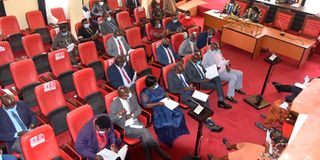Kakamega County Assembly passes Sh16.1 billion budget

Kakamega County Assembly in session on June 23, 2021. The MCAs passed the Sh16 billion budget for the Financial Year 2021/22.
The Kakamega County Assembly on Wednesday passed a Sh16.1 billion budget for the 2021/2022 financial year.
This gives Governor Wycliffe Oparanya, who is serving his final term, the opportunity to focus on implementing key legacy projects before he leaves office in 2022.
The county government has allocated Sh1.2 billion for development projects while the recurrent vote will receive Sh389.1 million.
In the estimates, the county government has set a target of Sh2.1 billion in its own-source revenue collection compared with Sh1.6 billion in the 2020/2021 revised budget.
Sh725.4 million
The development expenditure estimate is pegged at Sh7.3 billion, which translates to 45 per cent of the overall county budget.
The key projects lined up for completion include the County Teaching and Referral Hospital, which has been allocated Sh510.3 million, and the construction of the second and third phase of Bukhungu Stadium at a cost of Sh725.4 million.
Funds have been allocated for tarmacking several roads in the region to improve communication across the 12 sub-counties.
The roads include the 9.2km Bushiangala-Eregi–Lusiola stretch, which will be tarmacked at a cost of Sh130 million, while Sh100 million has been allocated for construction of a key tea factory in Shinyalu constituency.
The Health Services docket has been allocated Sh13 billion for development while Sh3.5 billion will go into the recurrent vote.
Last week, the Kakamega chapter of the Kenya National Chamber of Commerce and Industry (KNCCI) had petitioned the county government to urgently review levies introduced in the Kakamega County Finance Act 2020.
Single business permit
The new charges have been captured in the budget estimates for the 2021/2022 financial year.
But traders have protested the move to raise the charges, which include fire safety services fees, the single business permit and other levies, saying they will hurt their operations as they struggle to recover from Covid-19 disruptions.
In their petition signed by the KNCCI chapter chairman Wycliffe Majengo and chief executive officer Victor Wakhu, the traders said: “We bring to your attention that many complaints have been raised by the business community as far as the implementation of the Act is concerned.
“The charging of the fire service fees at a flat rate was the biggest issue and the general feeling that the county government should have factored the effects of the Covis-19 pandemic in the disruption of supply chains when implementing these rates as currently charged.”
The KNCCI proposals recommend that charges of Sh2,500 on small businesses, which usually operate from temporary structures, should be removed.





